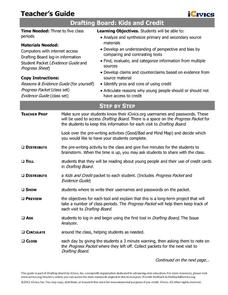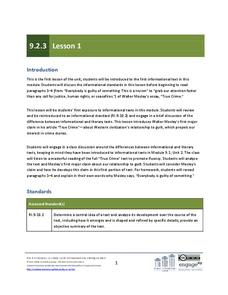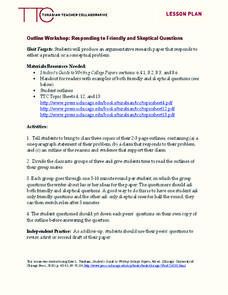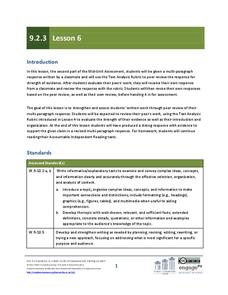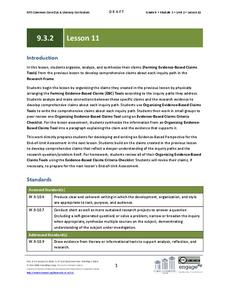iCivics
Drafting Board: Kids and Credit
Should kids under the age of 18 be given access to credit cards? Learners identify pros and cons of using credit, develop claims based on evidence, and finally argue reasons for or against credit for minors.
E Reading Worksheets
Tone Worksheet 3
The interpretation of a poem often lies in the mind of its reader, especially when reading the tone. Focus on author's word choice, middle schoolers read four different poems and briefly state a perceived tone for each, along with the...
Literacy Design Collaborative
Macbeth: Influence of Supernatural
Something wickedly wonderful this way comes in a lesson that focuses on Macbeth. After a close reading of the play, class members craft a literary analysis essay in which they use evidence from the text to show how Shakespeare uses the...
Novelinks
The Adventures of Tom Sawyer: Writing Assignment
Ask learners to focus on one scene in Mark Twain's The Adventures of Tom Sawyer in order to write an analytical essay about Twain's ideas surrounding childhood. The final assignment in a unit, this writing prompt requires learners to use...
EngageNY
Grade 9 ELA Module 2, Unit 2, Lesson 15
The terrible truth begins in a lesson that focuses on the final act of Sophocles' Oedipus the King. As ninth graders collect evidence that details the origin of Oedipus and how his birth relates to the prophecy everyone tried to avoid,...
EngageNY
Grade 9 ELA Module 2, Unit 3, Lesson 11
Who is to blame for Bernie Madoff's crime? Class members look for evidence Diana B. Henriques uses in The Wizard of Lies: Bernie Madoff and the Death of Trust to support her claims that we share the responsibility with Madoff.
EngageNY
Grade 9 ELA Module 2, Unit 3, Lesson 1
"True-crime stories, murder mysteries, up-to-the-minute online news reports, and (as always) rumor and innuendo grab our attention faster than any call for justice, human rights, or ceasefires." Or so says Walter Mosley in his Newsweek...
Turabian Teacher Collaborative
Outline Workshop: Responding to Friendly and Skeptical Questions
Answering questions is the best way to hone and revise your argument. Foster receptive writers with a workshop activity that promotes peer editing and argumentative writing skills. Given lists of both friendly and skeptical questions,...
EngageNY
Grade 9 ELA Module 4, Unit 1, Lesson 14
As a mid-unit assessment, writers use evidence from the supplemental reading articles "Globalization," "Our Addiction to Fast Fashion Kills," and "Bangladesh Factory Collapse: Who Really Pays for Our Cheap Clothes?" to draft an argument...
EngageNY
Grade 9 ELA Module 4, Unit 1, Lesson 24
Who bears the most responsibility for ensuring that goods are ethically produced? Using evidence drawn from Sugar Changed the World: A Story of Magic, Spice, Slavery, Freedom, and Science, the unit's central text, and from the...
EngageNY
Grade 10 ELA Module 3: Unit 3, Lesson 1
Human tissue for sale or rent? Scholars refer back to articles they read in the previous unit and make a claim as to whether they believe it's okay to sell human tissue. Learners talk with partners, complete an outline tool, and collect...
PBS
Predicting/Making a Hypothesis
As an introduction to the hypothesis and testing method of investigation, young history detectives engage in a special investigation of a family artifact. After watching a short video that demonstrates the method, they develop a...
Newseum
Civil Rights: Knowns and Unknowns
Class members generate a list of research questions to review the civil rights movement and determine what scholars still need to learn. Groups then select a different compelling question, create a hypothesis and find evidence to support...
National Endowment for the Humanities
The Glass Menagerie: Impact of Expressionism
Young scholars are challenged to write a realistic analysis of Tennessee Williams' nonrealistic memory play, The Glass Menagerie. Writers use the evidence gathered on their worksheets to craft an effective thesis and concluding statement...
K20 LEARN
Introduction to Arguing Effectively: Argument Writing
Which is better—Chick-fil-A or MacDonalds? High schoolers learn how to craft an argument essay by beginning an opinion statement. They state a claim, back up their claim with evidence, and consider counter calms. Scholars then create a...
K20 LEARN
The Most Dangerous Game
Readers of "The Most Dangerous Game" must argue which of Richard Connell's characters is the protagonist or antagonist. The lesson begins with scholars reading selected passages from the story and making predictions about who they...
K20 LEARN
Writing An Argumentative Paragraph: Argumentative Writing
Learning how to craft a cogent argument based on a solid claim, supported with evidence and solid reasoning, is an important life skill. Teach middle schoolers about argumentative writing with a lesson plan asking them to analyze the...
Curated OER
The Old Man and the Sea: Directed Reading Thinking Activity
Can you find the themes from Ernest Hemingway's The Old Man and the Sea in other books? What about picture books? Compare the novel to a picture book with a lesson about making predictions and finding textual evidence.
EngageNY
Grade 9 ELA Module 3, Unit 1, Lesson 5
Ninth graders study the study of animals in an informational text lesson plan that focuses on analyzing text structure. As learners continue reading the first chapter of Temple Grandin's Animals in Translation, they form inquiries and...
EngageNY
Grade 9 ELA Module 3, Unit 1, Lesson 6
Are cattle prods beneficial for herding cattle, or do they cause more harm than good? Investigate Temple Grandin's claim about animal behavior with a lesson that focuses on pages 20-23 of the first chapter of her book, Animals in...
EngageNY
Grade 9 ELA Module 2, Unit 3, Lesson 6
As part of a mid-unit assessment, class members exchange their draft of a multi-paragraph essay with a classmate, review their partner's writing using the provided text analysis rubric, and evaluate the strength of evidence, the...
EngageNY
Grade 9 ELA Module 3, Unit 2, Lesson 11
Asking questions often leads to more questions. In a research instructional activity based on Temple Grandin's Animals in Translation, ninth graders formulate claims based on the synthesis and analysis of each of their inquiry paths. A...
EngageNY
Grade 9 ELA Module 4, Unit 1, Lesson 9
The supplemental text, "How Your Addiction to Fast Fashion Kills," allows learners to compare how other writers use evidence to support the argument that "rich countries benefit from harsh and abusive labor practices in poor countries."...
EngageNY
Grade 9 ELA Module 4, Unit 1, Lesson 8
In a close reading of "The Overseer" chapter from Sugar Changed the World, groups focus on the words Aronson and Budhos use to contrast the lifestyles of enslaved people and their enslavers. The whole class then engages in an...
Other popular searches
- Evidence of Evolution
- Evidence for Evolution
- Citing Textual Evidence
- Textual Evidence
- Evidence for Plate Tectonics
- Supporting Evidence
- Continental Drift Evidence
- Archaeological Evidence
- Dna Evidence for Evolution
- Cite Evidence in Text
- Evidence for Geologic Time
- Indirect Evidence


